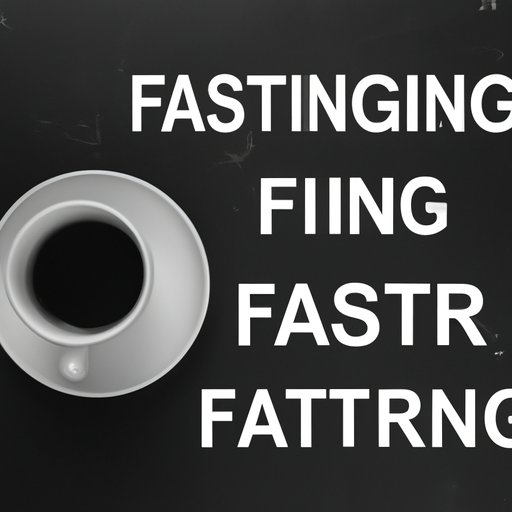
Introduction
Intermittent fasting has become increasingly popular in recent years as a way to lose weight, increase energy, and improve overall health. One question that often arises is whether or not it is okay to drink coffee while fasting. In this article, we will explore the benefits and drawbacks of drinking coffee while intermittent fasting, how to enjoy coffee without breaking your fast, the science behind coffee’s effect on weight loss, tips for making the most of your coffee break, common mistakes to avoid, the effects of caffeine on fasting, alternatives to coffee, and more!
Benefits and Drawbacks of Drinking Coffee While Intermittent Fasting
While coffee can have some potential benefits when it comes to intermittent fasting, there are also some drawbacks to consider. One potential benefit is that coffee can help suppress hunger and increase energy levels during the fasting period. Additionally, caffeine can increase focus and alertness, making it easier to get through the fasting window. However, drinking coffee can also cause dehydration, which is particularly concerning during a fast, and can interfere with the body’s insulin response, potentially leading to cravings and hunger pangs. It is important to weigh these factors when considering whether or not to drink coffee during intermittent fasting.
How to Enjoy Coffee While Intermittent Fasting Without Breaking Your Fast
If you choose to drink coffee while fasting, it is important to take steps to ensure that you are not breaking your fast in the process. One way to do this is to drink black coffee, which has zero calories and won’t interfere with the body’s fasting process. Another option is to use one of the many alternative coffee additives that are appropriate for fasting, such as almond milk, cinnamon, or MCT oil. Finally, you can experiment with different brewing methods and types of coffee to find what works best for you.
The Science Behind Coffee’s Effect on Intermittent Fasting and Weight Loss
Studies have shown that coffee can have positive effects on insulin sensitivity and fat metabolism, potentially enhancing the fat burning process during fasting. However, more research is needed to fully understand these effects and whether or not they translate to significant weight loss. It is important to keep in mind that there are limitations to the current research and that the results may not apply to everyone.

Tips for Making the Most of Your Coffee Break During Intermittent Fasting
When enjoying a cup of coffee during your fasting window, it is important to use the time mindfully and make the most of the experience. Consider using the break as a time for self-care, meditation, or relaxation. Pair coffee with healthy snacks like nuts or fruit to help stave off hunger pangs. Sip slowly and savor the experience to fully appreciate the benefits that coffee can bring.
Avoiding Common Mistakes When Drinking Coffee During Intermittent Fasting: A Guide
There are several common pitfalls to be aware of when it comes to drinking coffee during intermittent fasting. These include drinking too much, drinking too late in the day, or using coffee as a crutch to get through the fasting period. To avoid these mistakes, set limits on your coffee consumption and adjust the timing of your coffee breaks based on how your body responds. Listen to your body and be willing to experiment to find what works best for you.
The Effects of Caffeine on Intermittent Fasting: What You Need to Know
While coffee is a common source of caffeine, it is important to note that caffeine and coffee are not the same thing. Caffeine can be consumed in other forms, such as tea or energy drinks. While caffeine can have some benefits during fasting, such as increased energy and alertness, it can also interfere with cortisol levels and lead to increased anxiety and stress. If you need caffeine but are concerned about these negative effects, consider trying an alternative source of caffeine or limiting your intake of caffeine altogether.
Alternatives to Coffee During Intermittent Fasting: Exploring Other Beverages
If you are looking for alternatives to coffee during your fasting period, there are several options to choose from. Herbal tea is a popular choice, as it is calorie-free and has several potential health benefits. Water with lemon is another option, as it can help flush toxins from the body and promote hydration. Consider trying different types of tea or other beverages to find what works best for you.
Conclusion
In conclusion, drinking coffee during intermittent fasting can have both benefits and drawbacks. It is important to consider these factors and make informed decisions about whether or not to include coffee in your fasting routine. If you do choose to drink coffee, try to enjoy the experience mindfully and experiment with different types of coffee and brewing methods to find what works best for you. Remember to prioritize self-care and listen to your body, adjusting your routine as needed to achieve your individual goals and needs.





